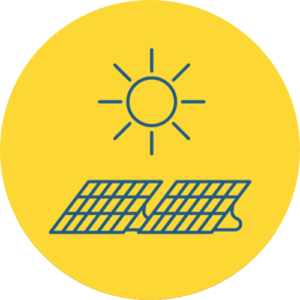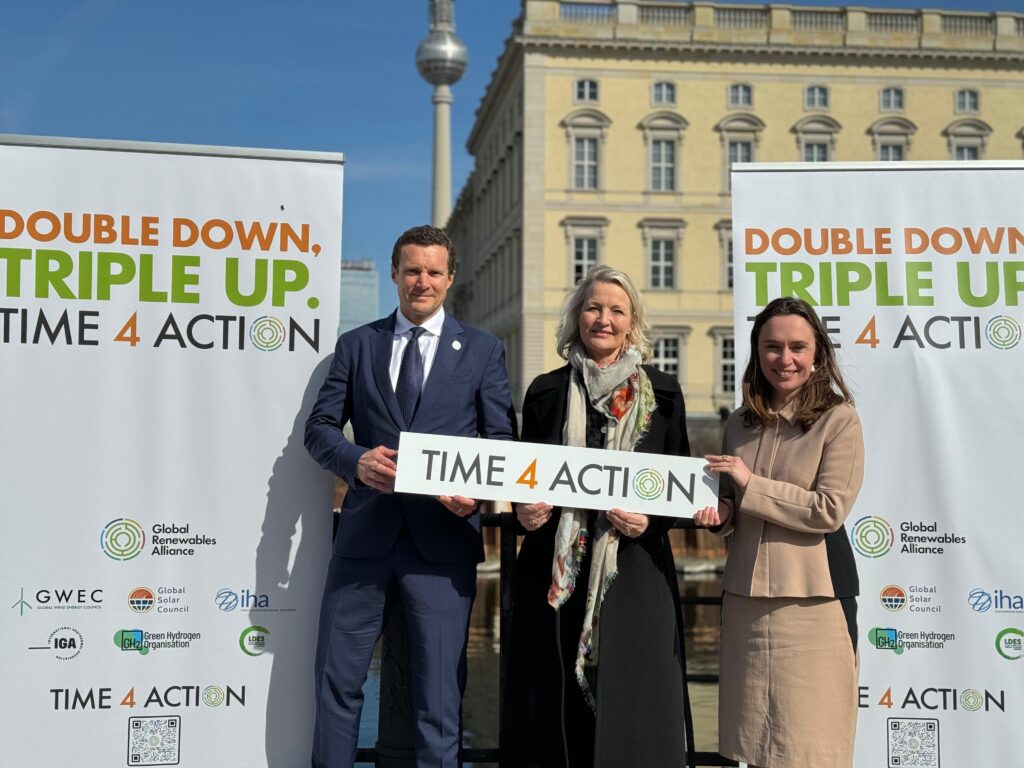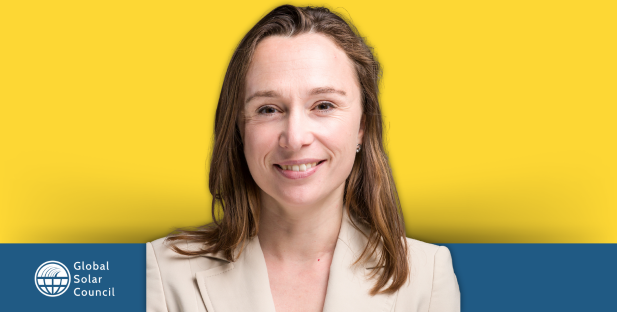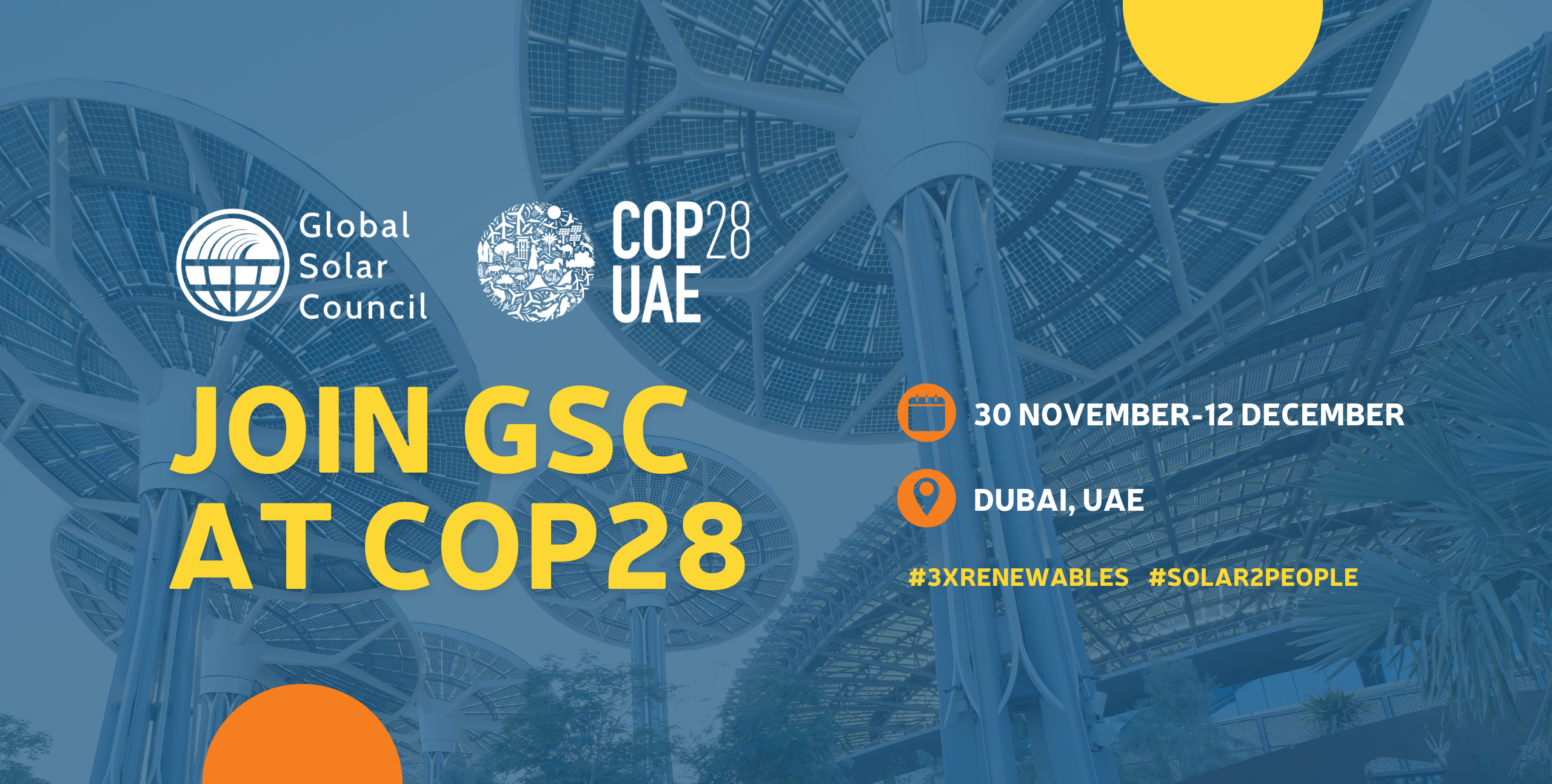
GSC at COP28
Amplifying the voice of solar as a key climate solution
The Global Solar Council (GSC) is organizing a series of events and initiatives at COP28 in Dubai from 30 November to 12 December to ensure that the global solar industry’s voice is heard loud and clear as a key solution to keep the world on a 1.5 °C pathway.
Check out our initiatives and programme of events at COP28 below for more information on how the solar industry is engaging at this year’s conference. If you have any questions or would like to get involved, please contact Alyssa Pek at a.pek@globalsolarcouncil.org.
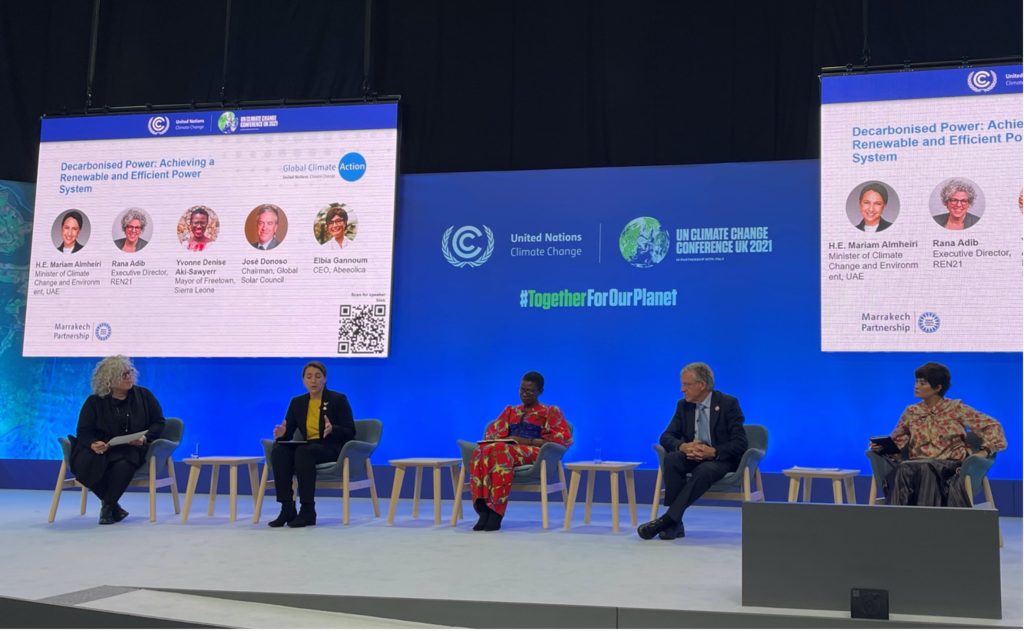
#3xRenewables
A call to triple global renewable energy capacity by 2030
Double Down, Triple Up
We launched the 3xRenewables by 2030 campaign on the 18th of September with other Global Renewables Alliance Members and 250 other companies and organisations representing a market value of more than $12 trillion. This emphatic call to action brings together the private sector, civil society and climate diplomats to issue a unified call to world leaders to commit to a target at COP28 this year to triple global renewable energy capacity to at least 11,000 GW by 2030.
That means accelerating build-out of wind power, solar power, hydropower and geothermal power, which would set the stage for technologies like long-duration storage and green hydrogen to take off. This would ensure energy systems are not only clean, but secure and just, and in turn, form the foundation of a net zero global energy system by 2050.
While each country and region will adopt a nationally determined approach to this common target, there are universal enablers for accelerating renewable energy. The renewables industry, investors and other key stakeholders stand ready to work together with governments to scale up deployment, however, urgent action is needed to implement this global target.
We urge world leaders and Parties to the Paris Agreement to make a firm commitment to tripling renewable electricity capacity to at least 11,000 GW by 2030 at COP28 this year. We are ready to work side-by-side with governments, industry, investors and civil society to collectively take actions, move faster and scale up renewables now.
COP28 Policy Agenda: What does this mean for solar?
In order to achieve this ambition and help the world avoid the worst impacts of climate change while contributing to sustainable development, the Global Renewables Alliance, of which the Global Solar Council is a founding member, has jointly published a COP28 Policy Agenda. This policy agenda is a call-to-action from the global renewables industry and aims to support policymakers and world leaders from across the world to install the renewable energy capacity needed to keep the world on a 1.5C pathway.
Solar PV can be deployed rapidly both at a large and small-scale, making it an ideal solution to keep pace with growth in power demand and ensure the sustainability of future economic growth. Solar PV also provides opportunities to be combined with energy storage or other renewable energy sources in hybrid power plants, which can ensure a reliable supply of clean and affordable electricity to customers. Finally, solar provides significant employment opportunities throughout its value chain, positioning it as the champion of the next generation of decent, secure jobs for workers. However, despite solar’s exponential growth in the last decade, its potential to be the foundation of a truly inclusive, just, and sustainable energy system of the future has yet to be realized.
The Global Solar Council has put together an overview of how the Global Renewables Alliance COP28 Policy Agenda translates into solar-specific recommendations to achieve the tripling target by 2030, with solar leading the way.
Pavilions
GSC is partnered with pavilions in the Blue Zone to make sure solar is front-and-centre at COP28
The Global Renewables Hub
Location: Mobility District, Pavilion MA15 (Blue Zone)
The Global Renewables Hub will be a space for political leaders, industry figures policy makers and key stakeholders to meet in the heart of COP28 and discuss how to deliver the rapid scale up of renewable energy that will ensure global renewable capacity can triple to 11,000 GW. by 2030.
As a founding member of the Global Renewables Alliance, the Global Solar Council is a co-organizer of this first-of-its-kind pavilion, joining together the global renewables industry to urgently scale-up renewable energy ambitions. Come meet us at the pavilion to attend an event, network, and more to support the scaling-up of solar and other renewables in countries across the world.
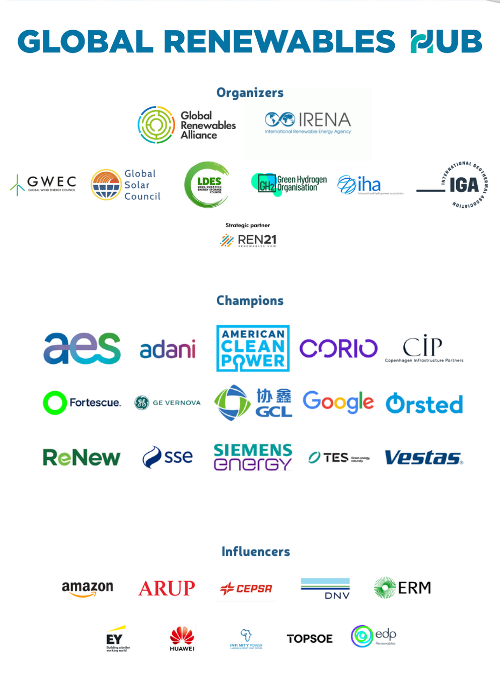
The Solar Hub
Location: Blue Zone
The Global Solar Council is proud to partner with the International Solar Alliance to organize a series of events on all the most important topics impacting the global solar industry. From new innovations, to policy and regulations, to financing, to manufacturing and supply chain – the events and discussions at The Solar Hub will be crucial to scaling-up solar globally.
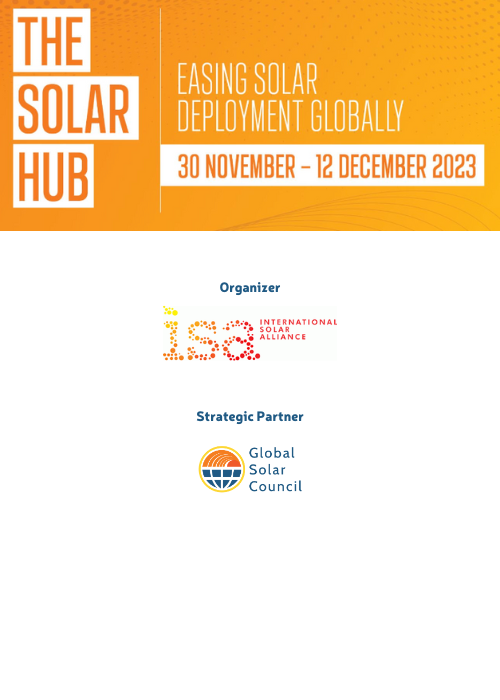
Where to find us?
The Global Renewables Hub and The Solar Hub are both located in the Blue Zone of the Dubai Expo City.
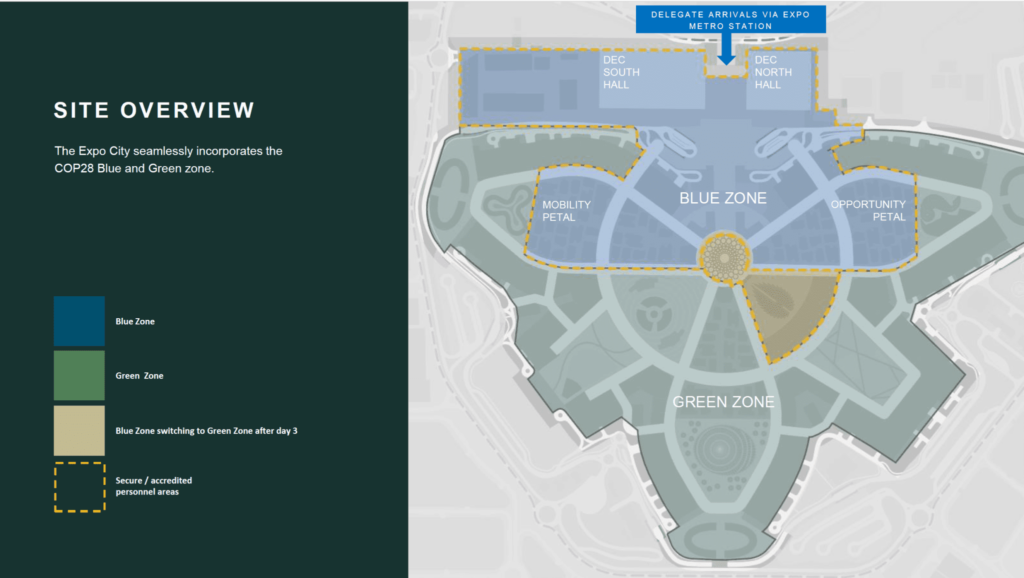
Programme
See below for an overview of all the events at GSC partner pavilions, as well as additional events GSC is involved in throughout the two weeks at COP28. All times are displayed in Gulf Standard Time (UTC+4)
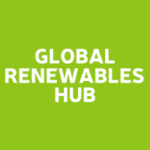



Theme: World Climate Action Summit
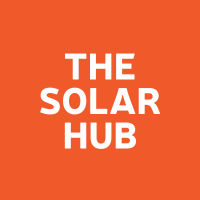
Open event.
Energy Efficiency

Open event organised by the Ministry of New and Renewable Energy, Government of India
Theme: World Climate Action Summit
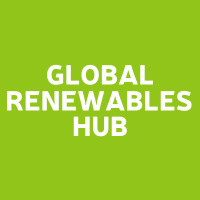
The Global Renewables Alliance (GRA) and the International Renewable Energy Agency (IRENA) are planning a series of regional public-private dialogues between industry leaders and government delegations at COP28 to exchange on how to create and expand robust and resilient regional supply chains for the energy transition, to support a just and equitable energy transition. These sessions are closed-door and invite-only. For more information on the sessions, please reach out to a.pek@globalsolarcouncil.org.

Open event.

Open event. Co-organized with the Asian Development Bank.
Theme: Health, Relief, Recovery, and Peace

AI solutions are emerging rapidly throughout the world, but what impacts will this have on the energy transition? This event will discuss both the supply and demand implications of AI on renewable energy, such as how to power the energy intensive AI sector with RE, and how to leverage AI to make RE projects and the grid more efficient. By understanding the interface between AI and accelerating the energy transition we can assess its role in driving forward energy system transformations, automation of lengthy and complex processes and increased efficiency in the sprint to meet our 2023 goals.

As countries plan for their net zero targets, substantially more long duration energy storage will be needed to support the integration of variable renewable energy. Various storage technologies exist or are being developed. Of particular importance is pumped storage hydropower, a mature and proven technology that already provides around 90% of installed electricity storage globally. This session will focus on new developments in pumped storage hydropower, exciting policy announcements, and how the massive potential for pumped storage hydropower can be harnessed to drive forward the clean energy transition.

Open event. Co-organized with the Africa Infrastructure Development Association.

Open event. Organized by IRENA.
Green Hydrogen Standard 2.0

The Green Hydrogen Standard 2.0 will be launched by climate and energy leaders committed to move towards zero-emissions hydrogen by 2030. The next decade will see a huge increase in the use of green hydrogen and green hydrogen derivatives in major sectors like shipping, steelmaking and aviation. We need green hydrogen standards that define what renewable electricity can be used to produce green hydrogen and emissions thresholds aligned with our net zero ambitions. As regional and national standards are evolving, the global Green Hydrogen Standard is being updated to move towards full lifecycle analysis, address hydrogen leakage, and consider requirements for biomass as a source of energy for green hydrogen production.
Solar for Health

Open event. Co-organized by HIeX, SEforAll, and International Solar Alliance.
Global Alliance for Sustainable Energy

Open event. Organized by the Global Alliance for Sustainable Energy.
Community-led RE projects

Open event. Organized by IRENA.
Championing Renewable Energy Mega Projects

Renewable generation capacity increased by almost 300 GW in 2022 and meeting the goals of the Paris Agreement will require more than 1 TW of installed capacity by 2030. Scale-up of renewable energy mega projects - defined as those bigger than 500 MW - will be critical to shifting the global energy mix at pace. This side event will showcase such mega projects, including large-scale solar farms (currently going up to over 2GW), giant offshore wind parks (currently going up to 3.6 GW) and major hydropower installations which can easily reach tens of GW of renewable power. Industry experts will discuss the enabling conditions that facilitated off-take of these mega projects and the economies of scale involved. The panel will also address challenges in financing, permitting and community engagement, seeking collaborative solutions to bring on more of these game-changing projects.

Open event. Organized by IRENA.
Theme: Finance, Trade, Gender, Equality, and Accountability

Attracting crucial investments for the energy transition in the Global South and leveling the playing field for countries that are burdened by debt and negative impacts of climate crisis-induced extreme weather events takes center stage at COP28.
This side event will focus on how the public and private sector can advance renewable energy projects in developing countries with a specific focus on spotlighting innovative industry solutions to un-lock private capital and secure bankable clean energy investment projects. In the Panel debate, industry experts, investors and policymakers will explore innovative financial mechanisms and risk mitigation strategies to attract private sector investments, spotlighting real-impact initiatives. By aligning policy efforts with industry cleantech and knowing how the financing sector can unlock the potential for transformative energy projects, propelling the Global South towards a more resilient future.

Open Event. Organized by IRENA.

Open Event. Organized by IRENA.

Open Event. Organized by GWEC.

Open Event. Organized by IRENA.
Parliamentary Accountability Summit

Open Event. Organized by IRENA.

Open event. Co-organized with the National Solar Federation of India (NSEFI)

Open event. Organized by IRENA.
Planning for Climate Commission

Climate disaster will not be avoided without significantly more hydropower, solar and wind power, electrolysers, green ammonia plants and grid infrastructure. All of this will require approval by hosting governments and buy-in from communities. In many countries and jurisdictions, it takes too long to obtain approvals for renewable energy projects, grid connections and infrastructure.
Fast and fair permitting of renewable energy and green hydrogen infrastructure is critical to avoiding climate disaster. Good policy practices and technological tools are emerging across the world that can be scaled up and shared across jurisdictions.
Building on the Planning for Climate nine-point plan for fast and fair permitting, a global coalition of government, industry and civil society will be launched. The coalition will drive efforts to shorten permitting timeframes by half by 2030, while committing to uphold high community engagement standards and practices.

Open event. Organized by IRENA.

Open event. Organized by IRENA.
Theme: Energy and Industry, Just Transition, and Indigenous Peoples

Open event. Organized by IRENA.

Open event. Organized by the European Union.

Open event. Organized by IRENA.
JETPs - Enabler for a Just Energy Transition

The energy transition can no longer be decoupled from a just transition. Both need to exist simultaneously. A just energy transition must encompass the delivery of a fair, and inclusive shift to a renewables-based energy system that provides equitable opportunities for all. This side event will explore the opportunities that arise from implementation of Just Energy Transition Partnerships (JETPs), including workforce development, productive uses of energy for local communities and improved gender equality. The event will spotlight successful community engagement models that empower local populations to actively participate in renewable energy projects in order to achieve a just energy transition.

Open event. Organized by the Global Offshore Wind Alliance.
Ministerial dialogue on Project Facilitation

Open event. Organized by IRENA.

Open event. Organized by IRENA.

Open event. Organized by Ministry of Power, Government of India

Open event. Organized by IRENA.
Breaking Barriers with Distributed Solar: Illuminating the Global South's Energy Landscape

Distributed solar PV in the Global South can both solve energy access problems, increase climate resilience and reduce air pollution. . It brings power to the people and insulates consumers and businesses from crippling blackouts.
Despite these immense benefits, the potential for distributed solar PV’s remains largely untapped.
This event will look at how we can turbo charge the roll out of on and off grid distributed PV in the Global South. , It will discuss how it can be used as a tool to drive decarbonization and sustainable development for a people-powered energy transition.
This event is part of the Global Solar Council's Empowering People with Solar PV initiative. Find out more here: https://www.globalsolarcouncil.org/empowering-people-with-solar-pv/
Corporate Renewable Energy Buyers

Financing and deployment of renewable energy projects largely depends on the ability of the off-takers to secure long-term power purchasing agreements. Corporations have played a pivotal role in driving the shift towards renewable energy by procuring those PPAs. Additionally, corporate purchasing of renewable power provides a blueprint for transition toward renewables-based industry and decarbonisation of heavy-emitting sectors. During this side event, industry leaders will share successful case studies, highlighting the economic and environmental benefits of procuring renewable power. The side event will also address challenges faced by corporations in transitioning to clean energy, exploring financing models and policy frameworks that support their efforts to achieve 24/7 100% renewable energy power systems.

Organized by IRENA.
Theme: Multilevel Action, Urbanization and Build Environment, Transport

Invite-only. Organized by REN21.

Aging, insufficient and disconnected grid infrastructure is holding back the global clean energy transition and presents a risk to achieving the global goal of tripling renewable energy capacity by 2030, and keeping 1.5 degrees within reach. It is vital that Governments address these challenges, and mandate the build-up of the electricity grid networks `{`and supply chains`}` to support the transition from fossil fuel sources, particularly coal, and integrate growing volumes of renewable energies. The renewables industry needs a strong and long-term commitment. Technical and regulatory barriers to renewables integration persist and are increasingly complex, but international cooperation and capacity building mechanisms are unlocking paths forward.
This event will launch the Green Grids Initiative’s Electricity Transition Playbook, showcasing the range of solutions required to transition grids whilst the panel will stress the urgency of addressing challenges facing grid operators with increased planning, rapid scaling of investment and buildout both at transmission and distribution level to deploy renewable technologies more efficiently and sustainability. The event will discuss new types of partnerships between the private sector and governments to expand grids that would safeguard the strategic value of grids as energy security assets.
Co-organized with the Renewables Grid Initiative and PPCA.

Open event. Organized by IRENA.

Open event. Organized by IRENA.

African governments and project developers have made ambitious plans for green hydrogen and its derivatives to ensure that the region's green hydrogen potential can be reached. This session will showcase the flagship policies and projects that are not only key to reaching net zero, but also ensuring that citizens can benefit from increased renewable energy access, clean water supply and green jobs.

Open event. Organized by IRENA.

The coming decade will be crucial to mitigate climate change, and a just pathway to net zero will not be possible without green hydrogen. With high renewables potential and significant import and consumption of hydrogen and ammonia, the Asia Pacific region is uniquely positioned to produce green hydrogen competitively, to decarbonize industries which are hard to electrify and to ensure energy security and self-sufficiency. This event will bring together government and industry leaders to identify actions needed in Asia to supercharge the development of green hydrogen projects in the region. These actions include regional collaboration to scale up green hydrogen markets and trade and adoption of policies and incentives to create demand and attract investment.

Open event. Organized by REN21.

Open event. Organized by IRENA.
Solar Awards Reception

The MESIA Solar Awards is the industry’s longest standing, premier awards ceremony, now in its Twelfth Edition! The solar celebration is revamped this year, featuring new categories, new submissions criteria and evaluations.
This year’s event aims to highlight the transformation of our sector while continuing to celebrate exceptional talent and achievements in the MENA solar market.
More information: https://www.mesia.com/solar-awards/
Theme: Rest Day
Cycling and Kitesurfing Event

The Cycling and Kitesurfing Event will be a public activity organised by the Global Renewables Alliance in partnership with the Dubai Sports Council and with support from Dii Desert Energy and Cycling 4 Climate on the margins of COP28.
The event will take place on December 7 (COP28 rest day) between 3:30-5:30 pm at the Kite Beach.
The event will feature participation of high-level government, private sector and civil society representatives participating in COP28 as well as engagement of citizens and residents of Dubai.
3:30-3:45 pm: Opening remarks by high-level guests
3:45-4:00 pm: Family photo
4:00-5:00 pm: Cycling activity
5:00-5:30 pm: Kitesurfing demonstration by Lewis Crathern, GWEC Ambassador, Ex World Champion
5:30-7:00 pm: Event wrap-up and post-event networking
Register here: https://www.eventbrite.com/e/cop28-cycling-and-kitesurfing-event-tickets-735321826377?aff=oddtdtcreator
Theme: Youth, Children, Education and Skills

Open event.

Roundtable, invite only.

Open event.

Open event. Organized by SEforAll.

Open event. Organized by RES4Africa.

Open event. Organized by CII.

The global energy transition presents significant opportunities to increase gender equality and women's empowerment. As outlined in IRENA’s report “Renewable Energy: A Gender Perspective”, women currently face barriers to entry and career advancement in the renewable energy sector. However, mainstreaming gender perspectives and implementing targeted policies and programs can help overcome these obstacles.
As GRA and the renewable energy industry call for a tripling of the world’s renewable energy capacity - to have 11,000 gigawatts installed by 2030, the next area of growth for the renewable industry is the monumental task of propelling the global energy transition towards a sustainable future. This transition will require a capable workforce and the active participation of women is vital not just for equality but as a strategic necessity.

Green manufacturing and solutions to make the supply chain more sustainable are essential to show that the RE sector is not just talking the talk, but walking the walk when it comes to sustainability. This event will discuss main challenges/bottlenecks, solutions and where the supply chain is headed.

Open event. Organized by SEforAll.
Enabling Youth Action on SDG7

Open event. Organized by IRENA.

Open event. Organized by IRENA.

Organized by IRENA.
Visual Expression of Humanity’s Values

Organized by Baha'i International Community.
Powering with Renewables Industry Drinks

Organized by GSC, Smart Energy Council and ABSOLAR.
Theme: Nature, Land Use and Oceans
Global Landscape of Renewable Energy Finance

Open event. Organized by IRENA.

Open event. Organized by GWEC.

Open event.

Open event. Organized by GWEC.

Open event. Organized by CARICOM FUND.
Ministerial Panel on achieving 100% renewable energy: How small island states can lead the way

Small Island Developing States (SIDS) are the countries facing the highest short-term risk of climate change disaster and disruptions to their supplies of diesel and other fuels. With sunny skies, powerful ocean winds, and relatively low energy demands – SIDS make for an ideal laboratory to experiment with a 100% renewable and flexible energy system, and show the world that this is not just a pipe dream, but a reality. This event will bring together Ministers representing SIDS across the world to discuss the technical and economic feasibility of 100% renewable energy for SIDS, progress made so far, as well as how SIDS can collaborate to exchange knowledge and lessons learnt to achieve this objective.
Organized by the Global Solar Council, Greening the Islands Foundation, and the Ministry for the Environment, Energy and Enterprise, Government of Malta.

The multi-stakeholder designed, independently assessed and internationally recognised Hydropower Sustainability Standard, is redefining renewables. Speakers explore financiers' engagement, industry pledges, and community ownership as catalysts for fostering sustainability best practices in hydropower.

To keep the world on a 1.5C pathway, urgent and significant action must be taken to reduce carbon emissions. But luckily one of the key solutions to make sure we avoid the worst impacts of climate change is already readily available: solar power. The Global Solar Council and other Global Renewables Alliance members, IRENA, the COP28 Presidency, and the European Union are all calling for a global target to triple renewable energy capacity to 11 TW by 2030 as a critical step towards achieving net zero – and solar will need to make up over half of these clean energy GW’s. This event will provide a stocktake of the current status of solar in different regions across the world, and what needs to happen in different countries and regions to scale-up solar deployment to make sure we achieve this goal.
Geothermal: How the earth's power plays a role in our energy transition and climate action

Open event. Organized by IRENA.
Theme: Food, Agriculture and Water

Open event.
Innovative RE solutions in agriculture

Open event. Organized by CARICOM FUND.

Open event. Organized by the Ministry of New and Renewable Energy, Government of India

Open event. Organized by IRENA.

Open event. Organized by IWMI and IBSA.
Harnessing data for the energy transition

Open event. Organized by IRENA.
Theme: Final Negotiations
Regulations for floating solar

Open event.

Open event.
Theme: Final Negotiations

Open event.

Open event.
GSC at COP28 news
Read all the latest updates from GSC on COP28 and the global solar industry.

